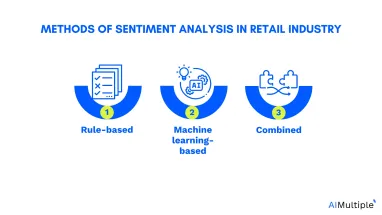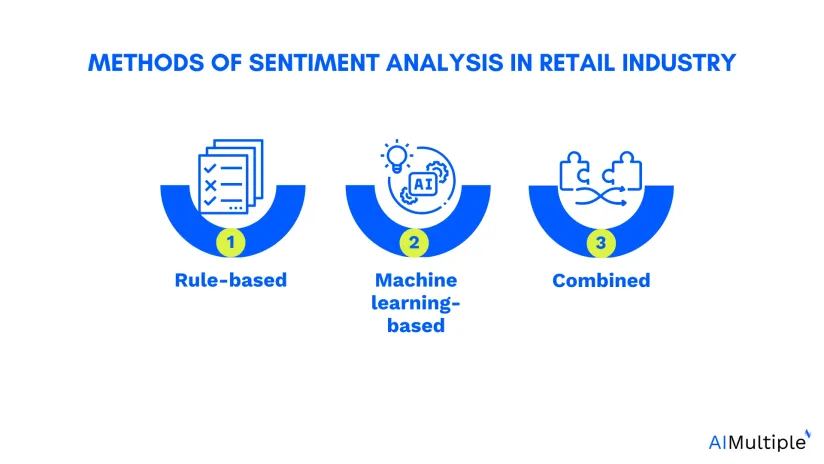In 2022, the retail industry surpassed $5 trillion for the first time, indicating a continuing desire to buy and consume.1 However, meeting an increasing number of customers’ needs, and standing out among competitors require great effort.
That’s why retail companies have started to automate their processes to benefit from AI-powered methods even more.2
Here are the top four benefits, methods and best practices of sentiment analysis in retail industry:
Benefits of sentiment analysis in retail
1. Improve product and service quality
Customers usually prefer to express their opinions or sentiments regarding brands on social media.
A recent report shows that almost 30% of customers change their usual retail store to meet their needs.3 That’s why understanding how the customers feel about your products is crucial to align with customers’ needs and increase customer retention.
Through sentiment analysis, you can examine your customers’ reviews, feedback, or comments on social media to get insights into the products least preferred, what they need, or what would make them happier. This allows you to improve your existing products, develop new ones, and provide better service quality.
For instance, you can analyze the sentiment in customer reviews on products and rank them. You can determine a cut-off point, then work on improving the products below it.
For more, feel free to check our article on the use of sentiment analysis in marketing.
2. Provide personalized service
A survey conducted by Segment indicates that 76% of customers feel frustrated when they do not receive a personalized experience.4 Personalized customer experience includes offering them promotions depending on their buying patterns, interacting with them with their names, or developing products that meet their expectations.
Sentiment analysis helps companies to understand their customers’ emotions and needs. You can analyze your customers’ feedback to offer them a personalized experience and increase their satisfaction. For example, you can explore the sentiment of your customers on social media and get insights into how to improve service quality.
3. Optimize marketing strategies
It is important to know what your customers think about your marketing strategies. Implementing sentiment analysis methods can be very helpful in measuring the ROI of your marketing strategies and either changing them or making necessary adjustments.
For example, the retail company Sears changed its logo in 2019 as a rebranding strategy to increase sales. However, they overlooked the importance of the emotional bond that customers may have with the old logo, which resulted in a bad rebranding strategy.5
By implementing sentiment analysis methods, you can get feedback from your customers before making your rebranding strategy public to understand how they feel about it. This helps you to prevent any unforeseen outcomes and minimize failure.
4. Increase brand loyalty
“If you’re trying to build brand loyalty today, an emotional connection is no longer a nice-to-have, it’s a need-to-have.”
René Vader, Global Sector Leader, Consumer & Retail, KPMG International.
Loyal customers are important for a brand in a way that 86% of them recommend the company to friends or family, 66% write positive reviews, and 46% remain loyal even after a bad experience.6 So, ensuring loyalty is essential for companies.
Small companies may personally interact with their customers and learn about their experiences. However, tracking every customer feedback is impossible if you are a tech giant, e-commerce retailer, or mid-level merchant.
As sentiment analysis is conducted with machine learning algorithms, it helps you to detect negative feedback or reviews and take quick action against them. Thus, you can provide better service or products, which in turn promotes customer loyalty.
Methods of sentiment analysis in the retail industry
In the retail sector, sentiment analysis has become a critical tool for understanding and responding to customer sentiment across diverse platforms. By analyzing customer feedback, online reviews, and social media posts, sentiment analysis helps retailers gain actionable insights into how customers feel about their brands, products, and services.
Understanding customer sentiment is essential for improving brand reputation, enhancing customer satisfaction, and fine-tuning marketing strategies. There are three primary methods of sentiment analysis widely used in retail: rule-based, machine learning-based, and combined methods.
1. Rule-based sentiment analysis
Rule-based sentiment analysis is a straightforward, fast setup method that identifies customer emotions by analyzing keywords in textual data. Using a sentiment analysis tool like VADER, retailers can assign sentiment scores based on specific positive, negative, or neutral words within customer comments and social media mentions.
- How it Works: The rule-based method utilizes predefined sentiment lexicons, lists of words tagged as positive, negative, or neutral. Each word in a sentence is analyzed, with the overall sentiment score derived from the sum of these individual scores.
- Best Use Cases: This approach is ideal for small retailers looking to start sentiment analysis without extensive data collection or specialized tools. It provides meaningful insights for social media monitoring and simple feedback analysis.
- Limitations: While it’s effective for quick sentiment identification, rule-based systems often miss the nuances of human language like sarcasm, complex grammar, and evolving language patterns, which limits accuracy for in-depth analysis.
Pros:
- Quick and easy setup
- Transparent in how sentiments are categorized
- Easily customizable with specific industry terms
Cons:
- Limited in handling complex language
- Needs frequent updates as customer language evolves
2. Machine learning-based sentiment analysis
Machine learning sentiment analysis is more advanced, using natural language processing (NLP) and sentiment analysis algorithms to gain deeper insights into customer sentiment. By analyzing large volumes of unstructured data, machine learning models learn to recognize patterns and contextual meanings that rule-based systems may overlook.
- How it Works: Machine learning techniques involve training algorithms like Support Vector Machines (SVM) or deep learning models such as CNNs and RNNs on vast datasets. These sentiment analysis models learn from past interactions, enabling them to recognize and adapt to subtle shifts in customer sentiment and provide a customer sentiment score.
- Best Use Cases: Machine learning is suited for large retailers managing complex data across multiple channels. It can extract meaningful insights from diverse sources like customer survey responses, social media platforms, and customer reviews.
- Limitations: Machine learning sentiment analysis requires significant data and technical resources. Retailers need experts to train and maintain the model, and while the system adapts over time, it requires a substantial initial investment.
Pros:
- Handles complex and nuanced language
- Adaptable to evolving customer sentiment patterns
- High accuracy for large-scale sentiment analysis
Cons:
- Requires large datasets and technical expertise
- Can be costly to implement and maintain
- Less transparency in how specific sentiment conclusions are reached
3. Combined sentiment analysis
The combined method integrates rule-based and machine learning approaches, offering the best of both worlds for customer sentiment analysis in retail. This hybrid approach allows retailers to leverage sentiment analysis to capture both basic and complex sentiments, making it particularly effective for medium-sized brands aiming for balanced accuracy and flexibility.
- How it Works: In this method, simple rules handle clear-cut cases while machine learning algorithms manage complex language. For example, positive words may be captured by rule-based criteria, while the machine learning model interprets sentiment from longer comments or challenging contexts.
- Best Use Cases: This approach suits medium-sized retailers or those seeking enhanced accuracy without the need for complete machine learning dependency. It’s ideal for reputation management, analyzing customer satisfaction, and tracking social media comments where both straightforward and nuanced sentiments are essential.
- Limitations: Combined methods, while more accurate, still require expert setup and can be more complex to manage. This approach may also involve higher costs than a purely rule-based system.
Pros:
- Balances simplicity and advanced analysis
- Captures both straightforward and nuanced sentiments
- Flexible and adaptable to changes in customer feedback
Cons:
- Requires expertise to implement and manage
- Can be more complex and costly than a simple rule-based approach
Choosing the right method
When selecting a sentiment analysis solution, retailers should consider factors like brand size, data volume, and resource availability. For small retailers, a rule-based system provides an affordable, accessible way to start gathering customer feedback insights.
Larger retailers with complex data needs may benefit from a machine learning system’s advanced capabilities, while a combined approach offers a balanced solution for brands seeking detailed, adaptable sentiment analysis without full dependency on AI.
Using sentiment analysis to monitor customer preferences, market trends, and customer loyalty helps retailers make data-driven decisions that enhance customer experience.
By choosing the right method and leveraging sentiment analysis effectively, retailers can deepen their understanding of consumer sentiment and proactively address customer needs, gaining a competitive edge in today’s market.
How to conduct a successful sentiment analysis in retail
Conducting sentiment analysis in the retail industry helps businesses manage brand reputation, enhance customer satisfaction, and gain valuable insights into customer preferences. Here is a step-by-step guide to performing an effective sentiment analysis, focusing on using sentiment analysis tools to analyze customer feedback and social media posts.
1. Data collection
Gather customer feedback from multiple sources, including social media, online reviews, and surveys. Collecting a large dataset ensures that you can analyze customer sentiments accurately and identify key patterns in customer opinions.
2. Data preprocessing
Clean the data by removing noise, such as irrelevant symbols or extra punctuation, and normalize the text (e.g., converting to lowercase). Using natural language processing (NLP), the text can be tokenized into words or phrases for further analysis.
3. Sentiment classification
Classify each customer comment as positive, negative, or neutral using sentiment analysis software powered by machine learning techniques like Naive Bayes or Support Vector Machines (SVM). Training a sentiment analysis model on labeled data allows the system to recognize sentiment patterns and improve classification accuracy.
4. Sentiment scoring
Extract specific themes in customer comments, such as product quality or customer service, and assign each theme a sentiment score. This scoring system highlights how customers feel about individual aspects, offering a deeper view of customer expectations and satisfaction levels.
5. Complete sentiment analysis
Link sentiment scores to individual product features or services, allowing a more detailed understanding of consumer sentiment. This analysis identifies areas where customers are particularly satisfied or dissatisfied, which can help target improvements effectively.
6. Visualization and reporting
Use sentiment analysis tools to create visual summaries of the findings, such as charts or dashboards. Visualizing overall sentiment analysis helps stakeholders quickly grasp trends in social media mentions and other sources, aiding in fast, data-driven decision-making.
7. Root cause analysis
Analyze negative sentiment scores to uncover recurring issues in customer feedback. Identifying and addressing negative sentiments tied to specific product or service features can significantly boost customer satisfaction.
8. Actionable insights and improvements
Convert insights from sentiment analysis into action by sharing findings with relevant teams, such as marketing, customer service, and product development. These teams can collaborate on solutions, whether through product upgrades, process adjustments, or marketing campaigns that address customer needs.
By following these steps, retailers can leverage sentiment analysis to improve customer satisfaction, strengthen brand reputation, and proactively respond to evolving customer needs and market dynamics.
Further Reading
External Links
- 1. Don’t believe the hype that retail is dying. The Hill
- 2. The future of work in retail automation | McKinsey. McKinsey & Company
- 3. June 2023 Global Consumer Insights Pulse Survey. PwC.
- 4. The value of getting personalization right—or wrong—is multiplying | McKinsey. McKinsey & Company
- 5. https://www.cnbc.com/2019/05/08/sears-unveils-a-new-logo-as-it-tries-to-boost-its-business.html.
- 6. The truth about customer loyalty. KPMG.



Comments
Your email address will not be published. All fields are required.